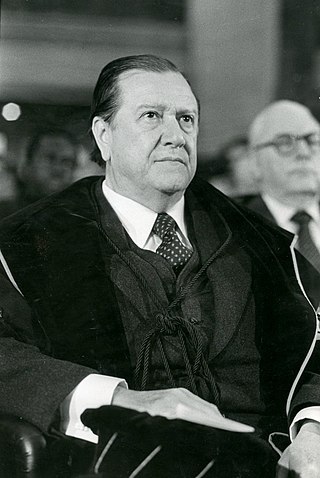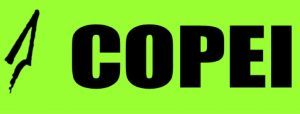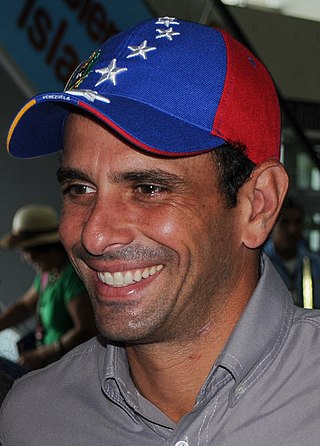
The politics of Venezuela occurs in a framework explained in Government of Venezuela.

The Fifth Republic Movement was a socialist political party in Venezuela. It was founded in July 1997, following a national congress of the Revolutionary Bolivarian Movement-200, to support the candidacy of Hugo Chávez, the former President of Venezuela, in the 1998 presidential election. The "Fifth Republic" refers to the fact that in 1997 the Republic of Venezuela was the fourth in Venezuelan history, and the Movement aimed to re-found the Republic through a constituent assembly. Following Chávez' 1998 election victory, this took place in 1999, leading to the 1999 Constitution of Venezuela.

Rafael Antonio Caldera Rodríguez, twice elected the president of Venezuela, served for two five-year terms, becoming the longest serving democratically elected leader to govern the country in the twentieth century. His first term marked the first peaceful transfer of power to the opposition in Venezuela's history.

Presidential elections were held in Venezuela on 6 December 1998. The main candidates were Hugo Chávez, a career military officer who led a coup d'état against then-president Carlos Andrés Pérez in 1992; and former Carabobo Governor Henrique Salas Römer. Both candidates represented newly formed parties, a first in a country where the main candidates always represented the parties of the bipartisanship. Chávez represented the Fifth Republic Movement (MVR), while Salas Römer represented Project Venezuela. Initially weak in the polls, Chávez ran on an anti-corruption and anti-poverty platform, condemning the two major parties that had dominated Venezuelan politics since 1958; and began to gain ground in the polls after the previous front runners faded. Despite the fact that the major parties endorsed Salas Römer, Chávez was elected into his first term as President of Venezuela.

Elections in Venezuela are held at a national level for the President of Venezuela as head of state and head of government, and for a unicameral legislature. The President of Venezuela is elected for a six-year term by direct election plurality voting, and is eligible for re-election. The National Assembly (Asamblea Nacional) has 165 members (diputados), elected for five-year terms using a mixed member majoritarian system. Elections also take place at state level and local level.

Democratic Action is a Venezuelan social democratic and centre-left political party established in 1941.

COPEI, also referred to as the Social Christian Party or Green Party, is a Christian democratic party in Venezuela. The acronym stands for Comité de Organización Política Electoral Independiente, but this provisional full name has fallen out of use. The party was influential during the twentieth century as a signatory of the Puntofijo Pact and influenced many politicians throughout Latin America at its peak.

The Radical Cause, stylized as La Causa Я, is a minor left-wing political party in Venezuela, and today part of the Venezuelan opposition to president Nicolás Maduro.

The National Convergence is a political party in Venezuela.

The Puntofijo Pact was a formal arrangement arrived at between representatives of Venezuela's three main political parties in 1958, Acción Democrática (AD), COPEI, and Unión Republicana Democrática (URD), for the acceptance of the 1958 presidential elections and the preservation of the new democratic system. The pact was a written guarantee that the signing parties would respect the election results, prevent single-party hegemony, share power, and collaborate to prevent dictatorship.

Francisco Javier Arias Cárdenas is a Venezuelan politician and career military officer, and was the governor of Zulia state. He participated in Hugo Chávez's unsuccessful February 1992 coup attempt, being pardoned in 1994 by Rafael Caldera, along with the other conspirators. He was elected Governor of Zulia state in 1995 for the Radical Cause, and challenged Hugo Chávez for the presidency in 2000. He subsequently served as Venezuelan Ambassador to the UN, and deputy to the National Assembly after the 2010 parliamentary elections.

Henrique Capriles Radonski is a Venezuelan politician and lawyer, who served as the 36th Governor of Miranda from 2008 to 2017.

The Republic of Venezuela was a democratic republic first established in 1958, and replaced in 1999 by the Bolivarian Republic of Venezuela. Venezuela saw ten years of military dictatorship from 1948 to 1958. After the 1948 Venezuelan coup d'état brought an end to a three-year experiment in democracy, a triumvirate of military personnel controlled the government until 1952, when it held presidential elections. These were free enough to produce results unacceptable to the government, leading them to be falsified and to one of the three leaders, Marcos Pérez Jiménez, assuming the Presidency. His government was brought to an end by the 1958 Venezuelan coup d'état, which saw the advent of democracy with a transitional government under Admiral Wolfgang Larrazábal in place until the December 1958 elections. Prior to the elections, three of the main political parties, Acción Democrática, COPEI and Unión Republicana Democrática, with the notable exclusion of the Communist Party of Venezuela, signed up to the Puntofijo Pact power-sharing agreement.

Henrique Salas Römer is a Venezuelan economist from Yale University, politically active in Venezuela since 1983.

César Alejandro Pérez Vivas, is a Venezuelan lawyer and politician associated with COPEI in Táchira State. From 2008 until 2012 was the Governor of Táchira.

Regional elections were held in Venezuela on 31 October 2004 to elect 22 governors and 2 metropolitan mayors for a four-year term beginning in 2004 and ending in 2008, when the next regional elections were held. The elections were originally scheduled for 26 September 2004, but faced technical issues and an application for annulment requested by the opposition, and were held under high political pressure after the events of the recall referendum of August 2004. The ongoing political crisis in the country and the proximity of the two electoral processes marked the environment of the elections, which were won by the candidates supported by the president, Hugo Chavez.

The Democratic Unity Roundtable was a catch-all electoral coalition of Venezuelan political parties formed in January 2008 to unify the opposition to President Hugo Chávez's United Socialist Party of Venezuela in the 2010 Venezuelan parliamentary election. A previous opposition umbrella group, the Coordinadora Democrática, had collapsed after the failure of the 2004 Venezuelan recall referendum.
Constituent Assembly elections were held in Venezuela on 30 November 1952. After the elections, it was planned that the Assembly would nominate a provisional president and then draft a new constitution. Although taking place under military dictatorship, with the main opposition party banned, the election was fair enough to permit early results showing an unexpected defeat for the ruling military junta as the Democratic Republican Union won 62.8% of the vote. The junta then blocked the final results from being published and installed General Marcos Pérez Jiménez as provisional President, an outcome confirmed by the Constituent Assembly, which the opposition parties boycotted.

Tomás Ignacio Guanipa Villalobos is a Venezuelan politician who is an incumbent deputy to the National Assembly of Venezuela and the leader of the Justice First party.
















